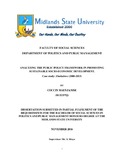Please use this identifier to cite or link to this item:
https://cris.library.msu.ac.zw//handle/11408/2402| Title: | Analyzing the public policy framework in promoting sustainable Socio-economic development. Case study: Zimbabwe (2000-2015) | Authors: | Maenzanise, Coccin | Keywords: | Public policy | Issue Date: | Nov-2016 | Abstract: | The study reviews how the interplay of socio-economic dynamics shaped policy decisions since 2000. Research findings suggest that the spirit of policy decisions bear the imprint of the prevailing macro dynamics. A climate of siege and anxiety has prevailed since 2000, when the State was in economic crisis, policy interventions were mainly contractionary and low note on local ownership social acceptance. After 2009, into the GNU and its aftermath, policy making was under highly untenable social, political and economic conditions. The study revealed that the current public policy framework in Zimbabwe is retrogressive in nature hence inequitable and back-playing sustainable development. It is retrogressive in the sense that the governing system has revolted from socialistic ideas which promoted pro-poor policy alternatives, adopting authoritarianism which has promoted growth and legitimacy to political elites.The research gives the historical context of public policy tracing the major changes in the types, structures and administration of public policy from crisis era of 2000 up to 2015. An analysis on the performances of the various public policies administered by the ZANU PF led Government is given, whilst, the implication of the various policy gaps on social and economic development is discussed. A cluster by cluster; Education, Health Sector, Service Delivery, Vulnerable Groups, Gender, Employment, Agriculture, Trade; analysis has been outlined to give an index on public policy performance towards sustainable development in Zimbabwe. The study also looks at the governing frameworks with regards to public policy and how these have perpetuated a retrogressive authoritarian capitalism anti-neoliberal governance system. This elitist policy making approaches has produced partisan, temperamental, exclusionary, hurried, and short-term reactive public policies. | URI: | http://hdl.handle.net/11408/2402 |
| Appears in Collections: | Bachelor Of Science In Politics And Public Management Honours Degree |
Files in This Item:
| File | Description | Size | Format | |
|---|---|---|---|---|
| MAENZANISE,C.pdf | Full Text | 869.38 kB | Adobe PDF |  View/Open |
Page view(s)
14
checked on Jul 26, 2024
Download(s)
20
checked on Jul 26, 2024
Google ScholarTM
Check
Items in MSUIR are protected by copyright, with all rights reserved, unless otherwise indicated.



